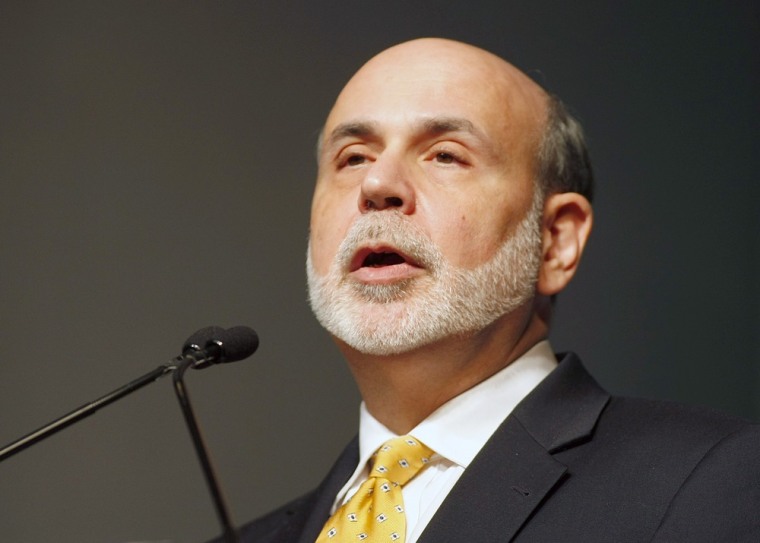
Federal Reserve Chairman Ben Bernanke called the economic recovery "disappointingly slow" but outlined no further stimulative measures, in a speech delivered at the Economic Club in New York.
Rather than meet expectations for more central bank easing, Bernanke instead again took Congress to task for leading the nation close to a dire fiscal situation that could cause another recession.
Bernanke has been preaching against the series of spending cuts and tax increases that will take place automatically in 2013, and he delivered yet another warning of what he has called the "fiscal cliff."
"The realization of all of the automatic tax increases and spending cuts that make up the fiscal cliff, absent offsetting changes, would pose a substantial threat to the recovery — indeed, by the reckoning of the Congressional Budget Office and that of many outside observers, a fiscal shock of that size would send the economy toppling back into recession," Bernanke said, according to prepared remarks.
While an address two days before a major holiday otherwise might not get much notice, chatter had increased that Bernanke would indicate additional stimulative measures from the central bank.
The Dow industrials turned modestly negative as the chairman's remarks were made public and uncertainty increased over the Fed's future plans. (Read More: Full Text of Bernanke Remarks)
Though Bernanke delivered no assurances Tuesday, consensus is that ultimately the Fed will continue to buy about $40 billion worth of mortgage-backed securities per month and halt its Operation Twist program at the end of the year.
The Twist program entails selling shorter-dated securities and buying those on the far end of the curve in an effort to drive down long-term interest rates. However, the Fed is running out of short-dated notes and bills to sell.
In its place is likely to come a renewed effort to buy about $45 billion a month in Treasurys and continue to expand the Fed's $2.9 trillion balance sheet.
The combination of MBS and Treasurys purchases then would continue on an open-ended basis until the Fed reaches economic growth that would foster an acceptable level of unemployment, currently at 7.9 percent. (Read More: Sandy’s Impact on Job Growth Will Be ‘Acute’: LaVorgna)
"Given the headwinds facing the US economy, including problems relating to US fiscal policy, it is hard to imagine a sustained acceleration in growth before the middle of 2013," economists at Nomura Securities said in an analysis. "That means that MBS purchases will likely go on until the third quarter of 2013."
Bernanke touted the benefits of the Fed's policy efforts.
"More generally, research suggests that our previous asset purchases have eased overall financial conditions and provided meaningful support to the economic recovery in recent years," he said.
The Fed likely will keep its promise to keep interest rates near zero until 2015.
"If there is any lesson from the financial crisis, it’s that financial stability is paramount in meeting broader policy objectives," said Neal Soss, economist at Credit Suisse. "Raising rates too much or too soon could expose a key vulnerability in the financial system. This is yet another argument for expecting interest rates to remain at very low levels for a very long time".
Though stopping short of outlining exactly what future efforts would entail, Bernanke said the Fed stands at the ready to do what is necessary.
"We will want to be sure that the recovery is established before we begin to normalize policy," he said. "We hope that such assurances will reduce uncertainty and increase confidence among households and businesses, thereby providing additional support for economic growth and job creation."
Some investors, though, worry that the stimulative measures, known as quantitative easing, will exact a steep price in the future. The first two rounds helped boost the stock market and commodities, though the third round announced in September has had little effect.
Fed critics worry that all of the money creation will lead to inflation once the central bank clears the debt it has purchased from its balance sheet.
Bernanke said inflation remains "subdued" despite high gas and food prices, adding that "ebbs and flows in commodity prices have had only transitory effects on inflation."
"Mark my words, the concern from about a year out from here is going to be all about monetary policy and how do we reverse this huge animal we created," said Jim Paulsen, chief market strategist at Wells Capital Management. "It won't just be here, it will be in Europe and China and everywhere. It's a huge problem. I wish they'd start thinking ahead a little bit."
Amid its stimulus efforts the Fed has pleaded with Washington political leaders to contain the burgeoning fiscal debt and deficit problems. A crisis awaits at the end of the year — Bernanke has nicknamed it the "fiscal cliff" — in which a series of tax increases and spending cuts will take place unless deficit-reduction targets are met. (Read More: Obamacare, Host of Others Need Slashing: Simpson-Bowles)
Deutsche Bank's Slok said indications that Washington is serious about debt and deficit reduction will be key before the Fed reverses its accommodative monetary measures.
"They will be worried about what the fiscal cliff could do to the outlook, and not only the fiscal cliff but the uncertainty that's associated with it," Slok said. "That's why the base case continues to be they will basically stop Operation Twist but continue to buy mortgages and on top of that expand QE3. In some sense, you could view that as the status quo because it's the same support to the economy."